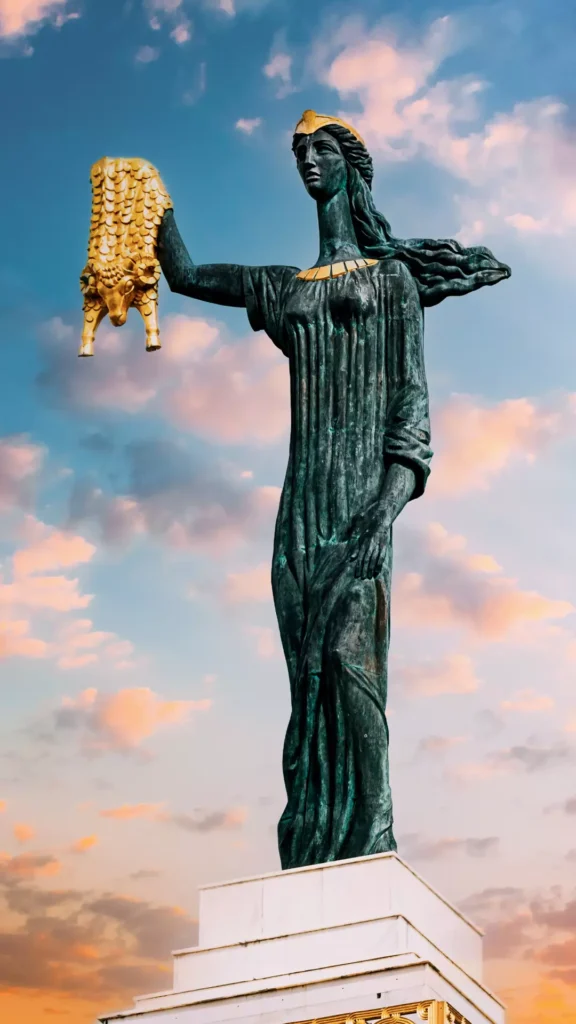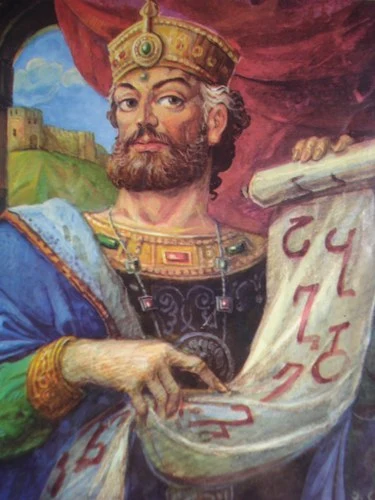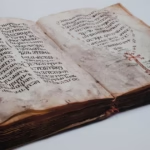Colchis: The Mythical Kingdom of the Golden Fleece

The earliest known political formations in western Georgia were the tribal unions of Diaokhi and Kolkha, emerging around the end of the 2nd millennium BC. By the 6th century BC, these entities had evolved into the Kingdom of Egrisi, better known as Colchis—a name immortalized in Greek mythology.
The capital of ancient Colchis was located near today’s city of Kutaisi, historically referred to as Kutaia or Kvataia. Colchis was advanced in both statecraft and economy; the region minted its own silver currency, known as the Colchis tetri, underscoring its thriving trade networks.
Governance in Colchis was monarchical, with rulers often believed to be descendants of King Aeëtes, a central figure in Greek legend. Colchis gained legendary status through the myth of the Argonauts, in which Jason and his crew sailed to Colchis in search of the Golden Fleece, highlighting the kingdom’s wealth and mystique.
Archaeological findings—including bronze and iron weaponry, intricate tools, and finely crafted jewelry—affirm the region’s sophistication and cultural wealth. These discoveries also underscore Colchis’s significance as a major cultural and trade hub of the ancient world, admired by both the Greeks and the Near Eastern civilizations.
Iberia: The Rise of Eastern Georgia’s Monarchy

While Colchis flourished in the west, a powerful monarchy emerged in the east: the Kingdom of Iberia, also known as Kartli. Established around the 3rd century BC, Iberia played a crucial role in shaping the political and cultural identity of Georgia.
One of the most influential figures of this era was King Parnavaz, revered not only for his administrative reforms but also for creating the Georgian alphabet—a foundational step in preserving national identity. Iberians referred to themselves as the descendants of Kartlos, their mythical progenitor, and named their land accordingly.
The capital city of Iberia was the strategically located Mtskheta, where major religious and political centers developed. During the 4th–3rd centuries BC, Iberia expanded its territory across Shida Kartli, solidifying its status as a formidable state.
Religion also played a central role in Iberian society. The worship of deities such as Armazi and Zaden led to the construction of monumental fortresses—Armaztsikhe and Zadentsikhe—near Mtskheta, reflecting both the spiritual and defensive priorities of the kingdom.
Roman Encounters and Regional Power
In 65 BC, the Roman general Pompey invaded Iberia. Despite fierce resistance, King Artagis eventually submitted. However, Iberia managed to regain a level of autonomy shortly after, leading to a period of diplomatic relations with the Roman Empire.
This alliance strengthened Iberia’s geopolitical position throughout the 1st and 2nd centuries AD. By controlling key passes through the Caucasus and leveraging relationships with nomadic tribes, Iberia maintained both military strength and trade routes.
Under King Pharsman II (reigning during the mid-2nd century), Iberia reached its territorial zenith, stretching to the Black Sea and overlapping with Roman domains. Tensions briefly arose with Emperor Hadrian, who unsuccessfully invited Pharsman to Rome. Eventually, during the reign of Antoninus Pius, Pharsman visited the imperial city and was honored by a statue erected in his name, as recorded by the historian Dio Cassius.
Legacy of Ancient Georgia
The ancient kingdoms of Colchis and Iberia laid the foundation for Georgia’s national identity, language, and statehood. These early civilizations not only influenced local developments but also played key roles in the broader geopolitical landscape of the ancient Near East and Europe.
From mythic legends and powerful monarchs to architectural wonders and cultural milestones, Georgia’s ancient history offers a captivating narrative for history enthusiasts, travelers, and scholars alike.







